Text
The Blunt Reality of Attack on Titan
August 4, 2020
Written by Samantha, Slutty Opinions
OPENING
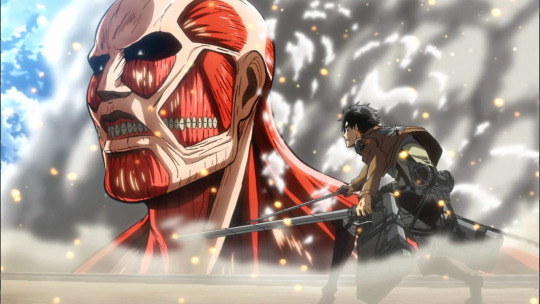
People usually tend to associate anime and manga with being crazy over the top action packed experiences. Attack on Titan is a series full of exactly that. It’s a hugely popular franchise known for having insanely cool action and bombastic music. People flying around doing impossible feats and fighting fantastical enemies that are larger than life are common. Despite all this flash and excitement, the series never lets you forget the harsh reality of the world itself in a unique way, effectively separating it from many of its peers.
This grim reality is basically used to beat the audience over the head over and over, at times too liberally and too often as some would argue. I personally think how the original author of the manga that started it all, Hajime Isayama, entwines every aspect of his story with cynicism and grimness is one of the major reasons why I love the series, and I’m willing to bet it’s a big reason for a lot of fans whether they know it or not. Before I get into the details, I will say that I won’t be putting in any real spoilers of either the manga or the anime so if you’re just curious about what I may have to say, you can keep going. I’d also like to mention that I am more of a recent fan, but still a big one. I’ve seen the entire anime and have been trying to catch up on the source material, so my knowledge and opinions will be limited to that amount of content.
THE TITANS
For anyone unaware of the basic premise of Attack on Titan, the last remnant of the human race has been trapped by huge humanoid beasts in an expansive settlement surrounded by walls. It is humanity’s job to fight off these mindless monsters and survive behind the walls. The titans are a large part of what creates the identity of the series. Seems kind of obvious since it’s literally the title and all. The way these titans are integrated into the action and the story of the show is a large part of what prevents Attack on Titan from simply being another generic action series that ends up forgotten as a flavor of the month. It seems like I’m not giving the series enough credit because there is a LOT it does right otherwise such as pacing, story structure, characters, and so on that combine to make an incredible experience that has captivated many. However, I still stand by the idea that the titans help make the franchise feel truly one of a kind.
Everyone who’s ever seen the titans has probably noticed how grotesquely and uncannily they are designed. In the manga, the whole world and the way many things and people are drawn especially all have very creepy vibes to it all. While it would be a huge stretch to claim Attack on Titan is a horror manga, it’s common sense to acknowledge it’s strongly influenced by horror. The absolute sense of uncertainty and powerlessness these monsters present nearly every time they’re on screen is overpowering to both the characters that must deal with them and the audience as well.
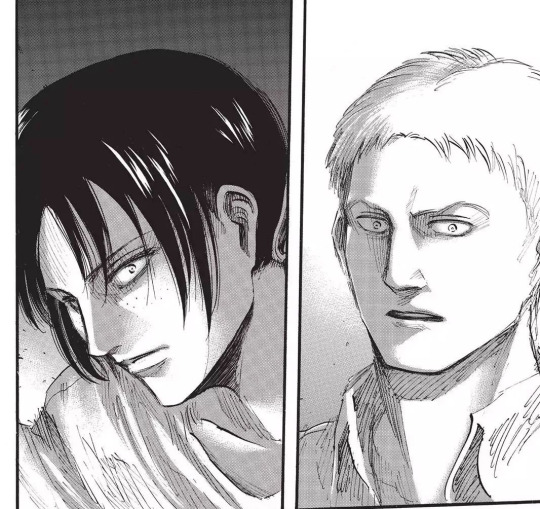
Isayama creates a feeling of dread involving these beasts insanely effectively. Any encounter with them even if it is merely 1 or 2 of them can always lead to sudden death. There is never safety in the presence of the titans even for the most skilled. Their pure size and physical ability is nearly never downplayed. While the humans have their own special weapons and crazy abilities, the titans are hardly ever presented as mere battle fodder or mulch. Titans happen to be very good at killing people and the delivery of it all makes it feel believable. Keeping the antagonists intimidating and serious is very important for the overall feeling of Attack on Titan.
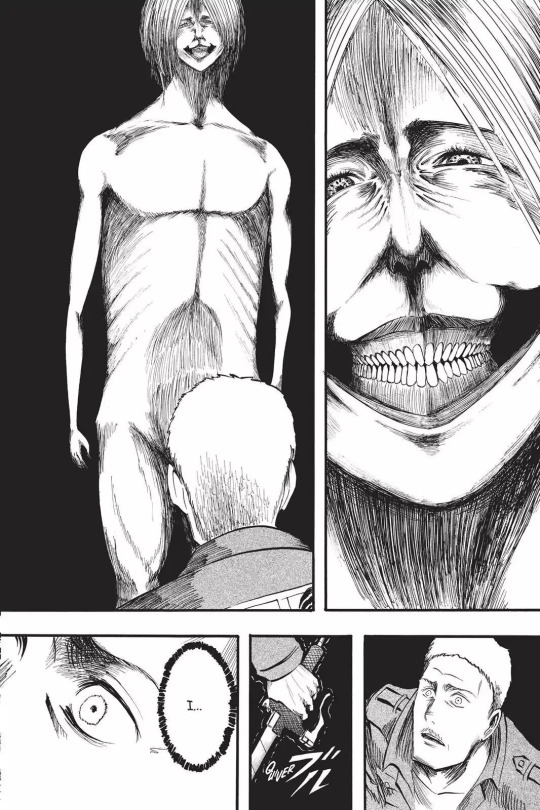
At times it can even feel like too much. The idea of any character dropping dead at any time can be very discouraging when you’re trying to get invested in a cast or just getting started. Sure that amount of pure “edge” in itself is appealing to a lot of people, but edge without purpose or substance makes for very bad entertainment in my eyes. It’s honestly in fact one of my pet peeves. I did not expect to like Attack on Titan for a long time due to this reputation it had for being brutal and random. Just not my style. When I actually gave it a shot however, I realized the writing is a lot more purposeful and I’d even say forgiving than I expected. While at times being an emotionally exhausting experience and definitely pessimistic in many ways, this series treats the terrible events that occur left and right with proper gravity and maturity.
THE NATURE OF WAR
Attack on Titan has a lot to say about a variety of subjects. It’s honestly much more subtle and intelligent than I even thought with my initial blind viewing of the anime. Reading the manga through the same events really gave me an appreciation for the thought and detail that goes into Isayama’s writing. The most obvious subject he focuses on is something that is probably less than subtle however and can be spotted quickly by anyone who has seen or read even a bit of the series.
That subject happens to be the horrors of war. On the surface the story seems to be just a simple story of man vs beast and it wouldn’t make much sense for it to have anything to say about war. While the circumstances involved are very fantasy-themed and at times ridiculous, it still at its heart is a narrative about war and how humans cope with it, both those on the front lines and those who watch from afar.
The grim and serious nature of the series is the way it is directly thanks to that theme. If life wasn’t always at risk, if it wasn’t treated as fragile, if death wasn’t respected and dwelled on and treated with the utmost permanence and seriousness, this theme would not work the way it does. Anything less runs the risk of just looking like glorification while merely saying the opposite. Admittedly there’s a lot of people who still somehow think Attack on Titan glorifies war but that’s a whole other subject. A very impactful and relevant part of the story is one early on where humanity wins a huge battle, yet no one bothers to celebrate merely because the overwhelming weight of the dead hangs heavier than any related relief ever could. This kind of grim and depressing, yet honest storytelling about war is very common throughout the plot.
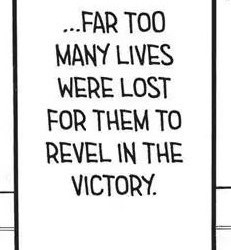
What it means to be a soldier, the intricate overlap of society, media, government, and economics on war, the will and the reason to fight, the sanctity of human life and the nature of sacrifice and finding meaning in meaningless and constant death are all discussed often and in detail in Attack on Titan and the grim realness of everything that happens in the story and the overall feeling of being unsafe it conveys are deeply important to allowing these themes and discussions to work as well as they do.
PHILOSOPHY AND PSYCHOLOGY
The last major aspect of the story that I think benefits greatly from the unrestrained reality and brutality of the series is the very unique philosophy and psychology that Isayama presents. Most of the points and lessons the characters learn through the story are not pleasant ones. Everything the characters go through and the utter bleakness of Attack on Titan’s world shapes everyone’s worldviews. People take small steps and make concessions to have hope in this world. Optimism is present plenty, but the way the characters experience optimism is still rife with sacrifice and harsh undeniable truths.
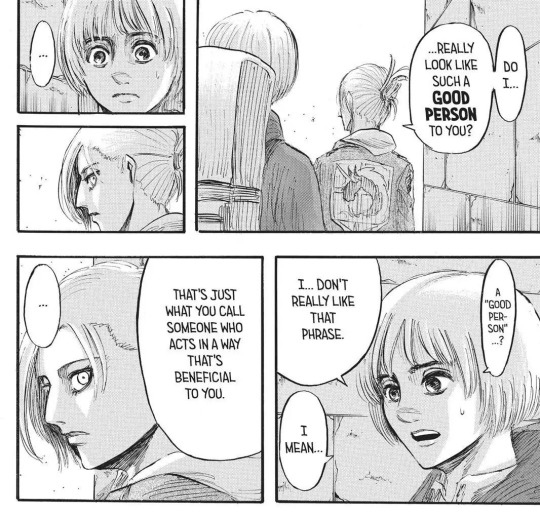
This very unique perspective compared to a lot of similar media is refreshing in its own way and kept me questioning what I knew. You couldn’t often easily predict the conclusions characters would come to because they are not what you may have come to expect from other media. One major character, Erwin Smith, is a great example of the kind of ideas Attack on Titan will throw around. His character is labeled as a demon by some, but a hero by the same people as well. The necessity of pain and sacrifice underlies all progress and achievement and he knows it and so do many others, even if it’s hard to accept. Having to create guidelines bound by the rules and expectations of reality only makes them that much more applicable to real life and real war.
Despite all this, the series never feels outright preachy. Characters dwelling on the meaning of what’s happening to them is specific to which character and which circumstances. It doesn’t feel nearly like the author is writing an essay about the way things are or should be while using characters as mouthpieces and more just people in a hard situation trying to make meaning out of the meaningless suffering around them. Agreeing or disagreeing with any point as a reader or viewer isn’t portrayed as wrong in any case it’s more a vehicle for thought as well as phenomenal character building. Like real war, none of the questions presented have a genuine correct answer. The character Levi himself at some point in the story even admits that as a veteran in battle, he can never be truly sure of his choices.
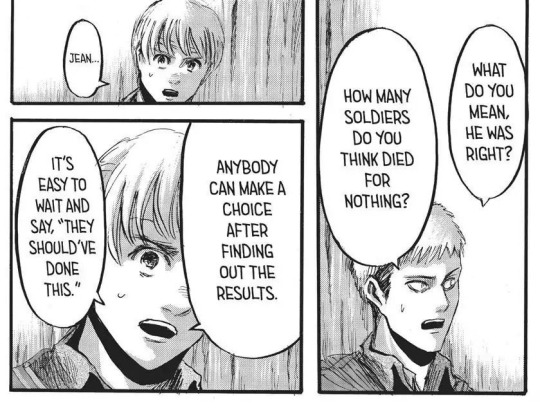
CLOSING THOUGHTS
The amount of respect and purpose Attack on Titan treats its frequent suffering with is key to the experience as a whole. While a series with just good writing all around and good reasons for its fame, something that in my opinion makes it feel like something special and something that captivated me is the overall gravity of the story. Without being effective at intensity and discomfort as well as in dealing with said discomfort, the story just wouldn’t feel real. And if it doesn’t feel real, it won’t feel like it matters. This series matters quite a lot to myself and many others and I hope this is at least a glimpse as to why.
18 notes
·
View notes
Text
Difficulty in Dark Souls and Why We Can’t Live Without It
April 6, 2019
Written by Samantha, Slutty Opinions
The debate on the role of difficulty in video games seems to, never actually end. It feels like something people talk about literally every year, and for some reason, Dark Souls (and the many games that have followed in its influence) is always the target. It feels like something that doesn’t need much debating in my opinion, but it gets brought up often regardless. For some reason, this topic gets me really riled up and I have a lot of strong opinions on it. It feels like I’m ready to go into a tirade any time I see it, and lately, I’ve been seeing it way too much. This article is kind of my own way of venting, as well as collecting all the arguments I’ve found in favor of how necessary challenge is, primarily in the new generation of From Soft and Hidetaka Miyazaki games. I think it’s important to address why this issue is truly a non-issue, why it came to be an issue in the first place, and why I even care. For the purposes of this article and keeping it simple, I’ll mostly be referring to one of my favorite games,
Dark Souls isn’t about being really hard
I’d be lying if I didn’t admit to Dark Souls being, pretty damn hard. It’s well above average in the department of making me constantly die and wince and feel tense. It’s not the type of game you can just pick up on a whim and breeze through, yet some people clearly want that experience from it or else I wouldn’t be writing this. For some ungodly reason, Dark Souls, or at least most of Miyazaki’s action games since Demon’s Souls is ALWAYS at the center of these discussions. Dark Souls has been the go to analogy for “hard game” for most gaming writers and journalists for YEARS now to much criticism and booing all around.
It’s hard to blame people who haven’t been exposed to the actual games for having this thought process. When Demon’s Souls first came out, it was a breath of fresh air for many in a time when games were getting more and more “dumbed down” across the board. Bandai Namco, the publisher for Dark Souls, decided to use this reputation to its advantage in advertising, calling the definitive edition of Dark Souls the “Prepare to Die Edition”. Streamers caught onto the game quickly as a very easy way to get views because seeing people die and struggle can be, well, fun!
Despite all this, that’s not even close to all there is to Dark Souls. The reputation can be a bit misleading, and it feels like a lot of the easy mode begging crowd knows not much else other than this reputation when it comes to the game. Probably the absolute best aspect of the way Dark Souls was made was its world. The map design is impeccable, it’s very very difficult to find a map more lovingly designed than Dark Souls 1’s. It has so many interesting rewarding shortcuts, feels completely logical and real in the way it was designed despite being in a fantasy world, feels extremely fluid, and is loaded with detail and character. If I were to recommend Dark Souls to someone, I would start with how much I love the world itself in all its aspects. The narrative, the characters, the detail, the risk and reward. I would never even think of telling somebody “It’s really hard and makes you feel cool at the end” (even if there is truth to that statement).
Nonetheless, Dark Souls wouldn’t be worth playing without challenge
I may have said that Dark Souls cannot be reduced to simply “hard game”, but, without being hard, it wouldn’t be a game I would recommend to anyone. All the goodness and enjoyment you can find in the depths of the game is built around the base of it being not an easy time. As I hinted at in the last section, the world design is very risk-reward in nature.
You often encounter forks in your path where you must decide which path is closest to the next checkpoint, or if you want to risk your current experience for more experience and treasure on the more dangerous route. Finding your way around this fluid map wouldn’t feel like much anything without the risk involved. The reward is only rewarding because you banked your skills on that risk. On an easy mode, any path you take would feel the same. Sequence breaking into a much higher level area would not have the punishment it contains to make the rewards worth it if you could waltz into those higher level areas.
The bosses are designed around persistence and patience. The reason the bosses are interesting is because they are something you learn. Many action games are built around reflex as well as training but Dark Souls’ philosophy of design is around dying as a teacher. Not only the bosses, but you advance slowly but surely through levels each time you come back. You win some, you lose some. Enemy placement is designed in a way so that each time you memorize them more, and in a sense, the game then becomes easy. That is the end goal of your adventure, at least, mechanically speaking. Easiness would strip that functional identity from it.
An easy mode would strip Dark Souls of its narrative identity as well
The idea of people asking for an easy mode so they can see the world and story without having to put in the time shows me that those asking don’t really know a lot about Dark Souls to begin with. As I already said, mechanically, the world would become uninteresting without the risk and reward. The writing of the game also revolves around this risk and the concept of persistence I described earlier. All you’d be doing on an easy romp is looking at a lot of brown stuff and reading cryptic item descriptions. I can’t comprehend wanting to pay for an experience like that and not just watching videos about it all that you can do for free. VaatiVidya has some great ones seriously, you don’t even have to have played the games to enjoy the videos. But, it would certainly help a lot.
The entire theme of Dark Souls is, patience and persistence. In the world your adventure is set in, humans are cursed to be undead and revived again and again. Miyazaki loves making gameplay have as little conflict with the narrative as possible, which is part of what makes his works so unique. This dying and reviving you do in game is what most people in the world around you do. However, most npcs have, limited purpose. Being a shopkeeper, being a warrior, a scholar, maybe even a cynic. Once their “purpose” they have sought out to find has expired, or they have lost confidence in it, they lose their very minds.
Your duty as the player character is to find the First Flame. Not important what that means for the sake of this article, just, your goal. The goal of many others in this world who are just like you. Because the player character is an extension of yourself, your will to find the ending, to find the flame, is imposed upon your avatar. You deciding to get up and give it another go at your true goal is like your character giving life another shot. Even in a cold, nihilistic world like that of Dark Souls, humans can find purpose and determination. Hope and patience are virtues in human beings, and they can allow us to surmount anything. That determination can even surpass the might of the gods themselves. The will to get up after being knocked down a ridiculous amount of times is what makes humans good and what makes life worth it. If you could run to the ending in 5 hours, you would not have gotten anything out of the writing in the game. All the character arcs, the crushing despair around you, the theme itself, gone. Someone could explain it to you as I am now, but that simply isn’t the same.
As I said earlier, a Dark Souls without challenge is a game I would simply never want to play. Miyazaki didn’t choose to make his games hard so tryhards and elitists could masturbate over their digital accomplishments. He makes them hard because that’s the way he feels he could make his art mean something. The way he could use the medium and the art form to the full advantage of his work in every dimension. It’s insulting to imply nothing would change with an easy mode added. I wouldn’t trust anyone who played the game on a setting like that to be able to give the game a proper analysis or review, especially not a journalist who is supposed to convey the core experience to an audience who doesn’t know what it is yet.
Dark Souls difficulty is overblown and overhyped
The reputation preceding Dark Souls is somewhat a false one. As I had previously said, saying it’s an easy or even moderate experience would be a lie. Dark Souls is definitely a hard experience, and one that serves it well as a piece of art. However, it being the “only hard game ever” as it seems to be conveyed in pop culture is a little ridiculous.
There are, a ridiculous amount of difficult games out there in the market. Many of which are much more difficult than Dark Souls and its sequels and much less forgiving. Many of which also do not have easier modes. Dark Souls gets an irregular amount of attention in the public eye and especially to lazy journalists for not much reason.
The game design in Dark Souls is built off pure willpower and the willingness to retry, not often reflexes and exact timing. It is designed in a way so that every death contributes to your end goal. Maybe on one run you opened a shortcut that makes your route easier, maybe you cleared out a miniboss that won’t respawn. Or you mastered your way around a specific enemy. There is no “game over state” in Dark Souls, and what you lose can easily be won back. The game design is punishing, but it gives you the resources to make sure you’re not losing progress or just going insane in general.
Let the artist decide their own art: Not all media has to be for everyone
In the end, an artist has the right to decide how they create, and what they create. As consumers, we reserve the right to get or not get a piece of work as well. If we feel something just isn’t good, or it isn’t accessible to us, or even just not our style, we don’t have to get it or consume it. Of course, this doesn’t mean you’re not allowed to complain about something. I complain about entertainment all the time and always make sure my thoughts on something are fully voiced even if my wishes are unrealistic.
Sometimes though, a piece of entertainment can, thoroughly not be your thing. That doesn’t necessarily mean it was poorly made, at times far from it. A personal example would be I did not like Zelda: Breath of the Wild as much as most. It was enjoyable, but more on an “average” level of enjoyable for me and I left frustrated not wanting to pick it back up, and just missing the older Zelda formula. While I do have specific critiques of the game and things it could have improved, I don’t think it’s a “bad game”. It’s amazingly made and there was a lot of love behind it. It’s just the exact adventure it was going for was not the adventure I was looking for, and that disconnect pushed me away from it.
I’ve seen people on the other side claim the statement of “not all entertainment is for you” is on its own elitist and gatekeepy but, it’s only an undeniable truth about the world. This statement doesn’t even have anything to do with the difficulty. If you REALLY REALLY didn’t enjoy Dark Souls no matter how many times you tried, making it easier wouldn’t change that. Maybe you disliked the tone, the aesthetic, the characters, the feel of the combat. All of that is valid because not everyone has to like everything. Changing some stats like health pools or damage won’t change the game design (The funny story is, I really didn’t like Dark Souls when I first tried it. I tried it maybe 10 times before it clicked, and now it’s my 2nd favorite video game franchise of all time.)
Comparing Dark Souls to other video games is quite honestly, a dishonest debate tactic. Trying to claim that “X hard game has an easy mode so, so should Dark Souls” is not very fair to it as a piece of art. Art is not homogenous or standardized, it’s art. As I explained very thoroughly before, I feel Dark Souls would be butchered had it had its challenge removed, even optionally. Some games even if designed with being very hard as its normal, can get away with easy settings for a variety of reasons. The story can be viewed through interesting dialogue and cutscenes that someone with less patience and time would want to see, it can offer a fun exploration of the mechanics in a way that makes you feel like you’re on a power trip versus on an uphill battle, etc. That choice is up to the individual game and the creator. It is clear Miyazaki and team have no interest in changing their art for the masses, and I can easily see why.
The claim against easy modes is not inherently elitist
People who stand up for my argument or parts of my argument are often targeted for being elitist gatekeepers trying to keep their precious game away from the masses. Making it easier would allow others to play it without struggling the same as the veterans, which would make the veterans insecure enough to fight against it. They earned their pointless digital trophy already and they want to keep it, all to themselves. Or at least, that’s what the people saying this stuff would have you believe.
“If the easy mode is optional, how does that bother you? You already finished the game, and now more people can play it! It’s a win-win. I can’t imagine a reason for fighting that concept other than to maintain your secret club and the status of it.” The truth is, Dark Souls fans (For the most part at least. I won’t deny elitists exist) desire more people to play their game with them, and will help anyone who seeks it. We just don’t want people playing a bastardized version of the game which as I explained, I wouldn’t recommend to basically anyone. It would be like discussing an entirely different game with people who think there is no difference. It’s not because they’re “weak” or “uncool” for choosing a hypothetical easier setting, it’s because that experience would not carry even near the same identity.
I cannot overstress the fact that Souls fans absolutely love to help. It is possibly one of the most guided games ever made. Video guides, written guides, guides of all types for all different people. The fandom is one of the surprisingly nicest, funniest groups I have known which is surprising due to how toxic the nature of fandoms tend to be, and how dark and lonely the concept of Dark Souls is. I guess this loneliness inspires people to band together in the real world, and try to make things light to contrast the nihilism often found in the world of the game? Just me throwing out crazy theories a little.
I would personally love to help anyone who wanted to try the game, the way it was designed to be played that is. I would sit beside any friend who wanted to get into it and help them until it clicks, if it ever does. The experience requires a lot of dedication and patience, so I would help teach that to others. Honestly, if it weren’t for friendly people in the community and the wonderfully put together internet guides, I never would have gotten into this series. The truth is, Dark Souls doesn’t have a magical barrier keeping gamers from playing it. The barrier is your own determination. Everyone is encouraged to try, and every single one of us as human beings have the potential to overcome it and learn it. It’s not that some people “can or can’t” play Dark Souls. It’s that some will, and some won’t. And any won’t can become a will. It’s an equal opportunity beatdown.
This argument is not actually about accessibility
Strange I had to wait until the end to get to this, since this is what the argument seems to revolve around the most. Is keeping Dark Souls as purely a difficult experience physically preventing disabled gamers from playing it? The journalists and pundits who advocate for the easy mode would like all of us to believe that. Kind of funny how little if any of those advocates are disabled or understand what disability means.
Accessibility is how, well, accessible, something is. It’s a really stupid statement but I can’t think of a better way to word it. Access is if a person can get their hands on something and experience it to the end like the rest of their peers. Is being simply, not easy, an accessibility issue? In my opinion, no, not at all. Accessibility issues include things such as good controllers, customizable visuals and user interface, customizable button mapping, fair game design, etc. None of these categories has anything to do with difficulty. Implying disabled gamers can only play point and click games is kind of insulting in my personal opinion, not that I am disabled myself so forgive any assumptions I may make.
The truth is, disabled gamers CAN play Dark Souls and similar games. As I have basically beaten to death already, the core game design of Dark Souls is patience, and determination. It’s about basic learning and trying, a very human instinct that all of us have and can use or weaponize. The gameplay is fair, and somewhat slow, and more punishes you for not being prepared or for lapses in judgement than simply not being able to press the buttons fast enough. If a gamer has the tools needed to physically play the game in as comfortable a way they can, how hard the game is shouldn’t change their access.
Difficulty, at least in a fair game, is only a test of how many times you are willing to get up and face adversity, a lesson Dark Souls tries to impart in its own story. If anything, disabled people all over the world know this lesson by heart already. It doesn’t matter how unfair the cards you were dealt are, or how oppressive your surroundings are. If you want to keep moving, and if you have reasons to keep moving, you can find, purpose. Regardless of how you were born or what life has done to you if you continue to get up you can essentially win. Dark Souls is easier than life in that way since it does have a definitive “end state” to it. An end that is accessible to anyone of any standing given the patience and drive, and resources to experience the world.
This whole debate is manufactured to an extent
The reason this debate even arose again to begin with, and why it keeps showing up over and over again is you guessed it, games journalists. Even though by writing this I’d consider myself a journalist as well, I don’t hold much high regard for the field as a whole which is not a very unpopular opinion and hasn’t been for quite a few years. The easiest way to get clicks on anything, video game news or news news, is to get people angry at what you’re writing. Hate clicks generate easy revenue. If someone sees something they agree with while scrolling, they may nod and keep going. But if they see something that makes their blood boil, they’ll screenshot it and read it to make sick burns against it and show the mess to their followers.
Of course then that starts a cycle of people pulling said article up over and over and it generating an internet hate storm with people now defending the original point. This whole mess was the internet falling hook line and sinker for some poorly paid overstressed sap’s click scam. Probably multiple scams coalescing into one bigger mess. I admit I in writing and publishing this have fallen for it, but hey, I enjoy doing what I do, and I feel it’s worth sharing my side.
Another possible motivation for manufacturing petty crises from a journalist’s point of view as I’ve seen many point out is the simple fact that journalists face deadlines. It is a very and I mean very stressful part of their careers, and for game journalists, their deadlines are based on when they can finish a game. It’s why a lot of lengthy rpgs don’t get treated very fairly or have entire sections excluded from review, and why now these same people are begging for notoriously difficult games to be easier. The sooner they can finish it, the sooner the stress is gone and the sooner they can be paid. Having the responsibility of your paycheck based on your patience when you don’t have much time for patience can cause some to snap and write what they wrote. In the end though, I just pray I never have to read reviews of journalists reviewing a From Soft game on easy mode, because that wouldn’t be much of a review at all.
Why I even care
For those of you still reading, thank you, so much. From the bottom of my heart. It may have become clear in reading why I put so much time into this, or why I get so angry every time I see this argument come up, but it may not be. I’d like to make it very clear why. This game series is very close to my heart, and seeing people act all-knowing about it when it’s clear they haven’t touched it at all or for at most 5 minutes makes my blood boil.
On top of pretending to know game design on a game they know nothing about, they resort to cheap tactics such as guilt tripping and shaming. The whole “elitist” route trying to make the opponents seem like pretentious asses is not very mature for starters, and trying to shift the fact that they lack patience or simply don’t like a game onto being about the rights of the disabled makes me angrier than anything. I have seen many many disabled gamers become furious at these people and for good reason. I have been furious about this for a very long time now, and I hope putting my thoughts to paper will calm me, even if only for a little while.
I sincerely hope my thoughts gave you a new outlook on something or other. That is the most I could ask for as a writer. If not, and you still read this far, I hope I made your day brighter.
44 notes
·
View notes